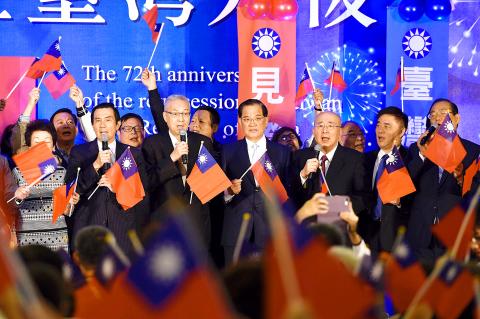Chinese Nationalist Party (KMT) leaders yesterday slammed the Democratic Progressive Party (DPP) for disputing the legitimacy of Taiwan’s retrocession from Japan to the Republic of China (ROC).
The 1943 Cairo Declaration should be considered legally binding, former president Ma Ying-jeou (馬英九) and former vice president Lien Chan (連戰) said at a rally held by the KMT in Taipei to mark the 72nd Retrocession Day.
The Cairo Declaration refers to the document Allied leaders produced in Cairo in 1943, which states their goals for the post-war order, including restoring Taiwan to the ROC after the end of World War II.

Photo: George Tsong, Taipei Times
The Ministry of Education might have omitted the Cairo Declaration, the Potsdam Declaration and the Treaty of San Francisco from its curriculum guidelines, but those events are the basis in international law for Taiwan’s retrocession, Lien said.
The ministry’s purported intention to omit them from history is tantamount to self-deception, he added.
The government should show its vision and decisiveness, like the Chinese Communist Party did at its 19th National Congress that ended on Tuesday, he added.
President Tsai In-wen (蔡英文) has not explained her vision or policy to the public, Lien said, adding that the Tsai administration should recover “the key to cross-strait peace.”
“Past KMT governments’ contributions to cross-strait relations should be made clear to the public,” he said.
The ROC’s authority to levy taxes, conscript soldiers and hold popular elections in Taiwan is the result of the Cairo Declaration, which states that Japan stole Taiwan from China, Ma said.
Over the past decade, some have said that the Cairo Declaration is not a valid international treaty, but a treaty is not necessarily named as such, Ma said.
In addition, the Japanese government accepted the Potsdam Declaration when it surrendered to the Allies, Ma said.
Those who dispute the validity of the Cairo Declaration should be dismissed as amateurs, Ma said, naming former vice president Annette Lu (呂秀蓮) of the DPP and former minister of education Tu Cheng-sheng (杜正勝), an Academia Sinica historian.
More than 100,000 Taiwanese died fighting the Japanese invasion of Taiwan in 1895, which comprised about 3 percent of the nation’s population at the time, Ma said.
“To speak of the War of Resistance Against Japan today, one must start with Taiwan to do justice to the martyrs who died here,” Ma said.
KMT Chairman Wu Den-yih (吳敦義) called on the public to “imitate the spirit of the martyrs” in building cross-strait peace, stability and prosperity.
“Making the ROC in Taiwan a paradise on Earth is a mission worthy of the spirit of Retrocession Day,” he said.

Alain Robert, known as the "French Spider-Man," praised Alex Honnold as exceptionally well-prepared after the US climber completed a free solo ascent of Taipei 101 yesterday. Robert said Honnold's ascent of the 508m-tall skyscraper in just more than one-and-a-half hours without using safety ropes or equipment was a remarkable achievement. "This is my life," he said in an interview conducted in French, adding that he liked the feeling of being "on the edge of danger." The 63-year-old Frenchman climbed Taipei 101 using ropes in December 2004, taking about four hours to reach the top. On a one-to-10 scale of difficulty, Robert said Taipei 101

Nipah virus infection is to be officially listed as a category 5 notifiable infectious disease in Taiwan in March, while clinical treatment guidelines are being formulated, the Centers for Disease Control (CDC) said yesterday. With Nipah infections being reported in other countries and considering its relatively high fatality rate, the centers on Jan. 16 announced that it would be listed as a notifiable infectious disease to bolster the nation’s systematic early warning system and increase public awareness, the CDC said. Bangladesh reported four fatal cases last year in separate districts, with three linked to raw date palm sap consumption, CDC Epidemic Intelligence

Taiwanese and US defense groups are collaborating to introduce deployable, semi-autonomous manufacturing systems for drones and components in a boost to the nation’s supply chain resilience. Taiwan’s G-Tech Optroelectronics Corp subsidiary GTOC and the US’ Aerkomm Inc on Friday announced an agreement with fellow US-based Firestorm Lab to adopt the latter’s xCell, a technology featuring 3D printers fitted in 6.1m container units. The systems enable aerial platforms and parts to be produced in high volumes from dispersed nodes capable of rapid redeployment, to minimize the risk of enemy strikes and to meet field requirements, they said. Firestorm chief technology officer Ian Muceus said

MORE FALL: An investigation into one of Xi’s key cronies, part of a broader ‘anti-corruption’ drive, indicates that he might have a deep distrust in the military, an expert said China’s latest military purge underscores systemic risks in its shift from collective leadership to sole rule under Chinese President Xi Jinping (習近平), and could disrupt its chain of command and military capabilities, a national security official said yesterday. If decisionmaking within the Chinese Communist Party has become “irrational” under one-man rule, the Taiwan Strait and the regional situation must be approached with extreme caution, given unforeseen risks, they added. The anonymous official made the remarks as China’s Central Military Commission Vice Chairman Zhang Youxia (張又俠) and Joint Staff Department Chief of Staff Liu Zhenli (劉振立) were reportedly being investigated for suspected “serious